Analysis of Becky's Needs: Maslow's Hierarchy of Needs
VerifiedAdded on 2023/06/10
|5
|1172
|269
Homework Assignment
AI Summary
This assignment analyzes a case study about a recent college graduate named Becky, who struggles in her new job. The analysis applies Maslow's Hierarchy of Needs to identify which of Becky's needs are unmet, specifically her social and self-esteem needs. The assignment explains how the interference with these needs affects Becky's overall wellbeing, leading to stress and unhealthy coping mechanisms. Furthermore, it addresses time management as a critical issue in the scenario, proposing potential solutions that involve changes from Becky, her mentor Elaine, and her colleagues. The assignment highlights the importance of understanding and addressing these needs for individual well-being and workplace effectiveness, referencing Maslow's theory and its implications.
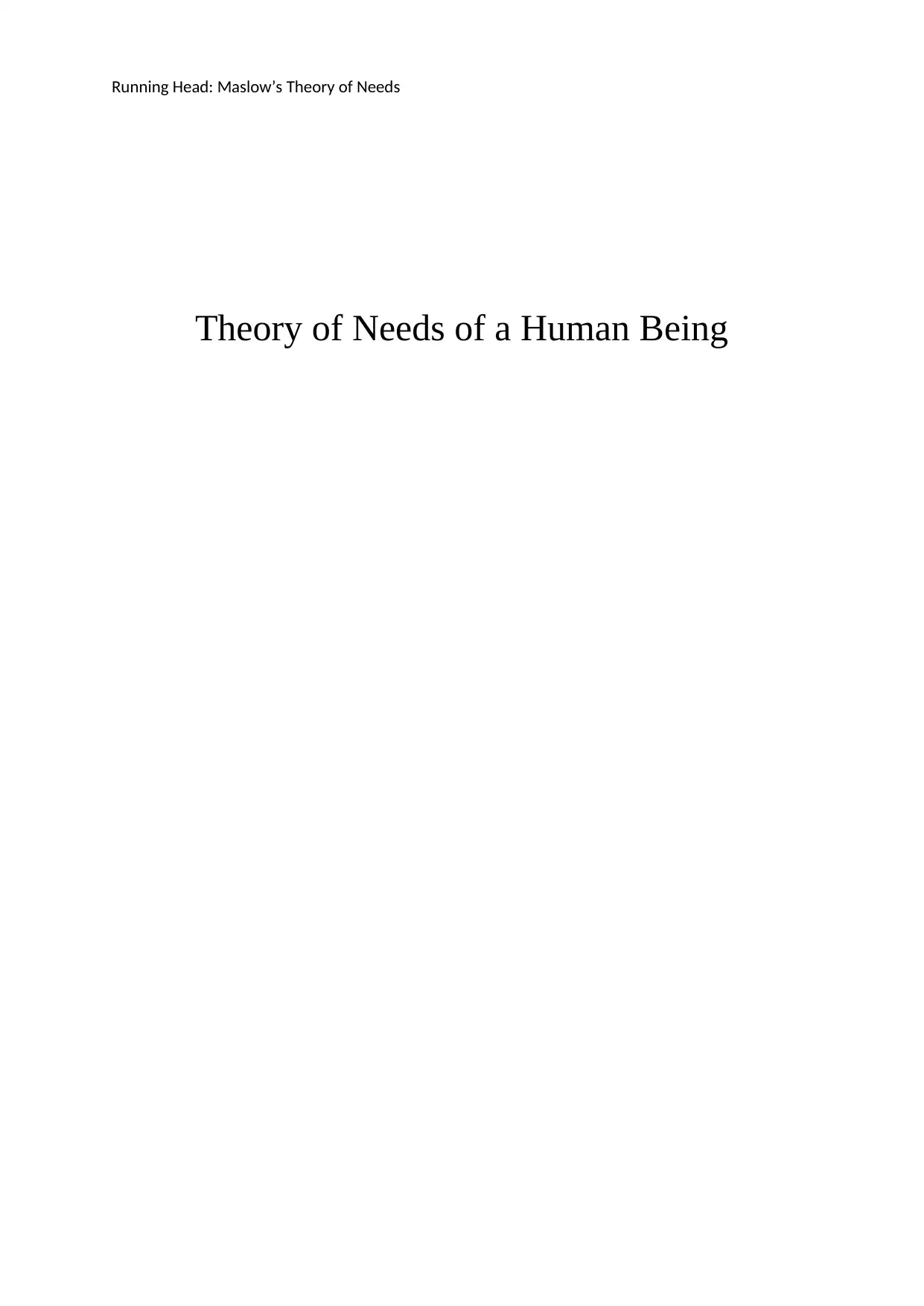
Running Head: Maslow’s Theory of Needs
Theory of Needs of a Human Being
Theory of Needs of a Human Being
Paraphrase This Document
Need a fresh take? Get an instant paraphrase of this document with our AI Paraphraser
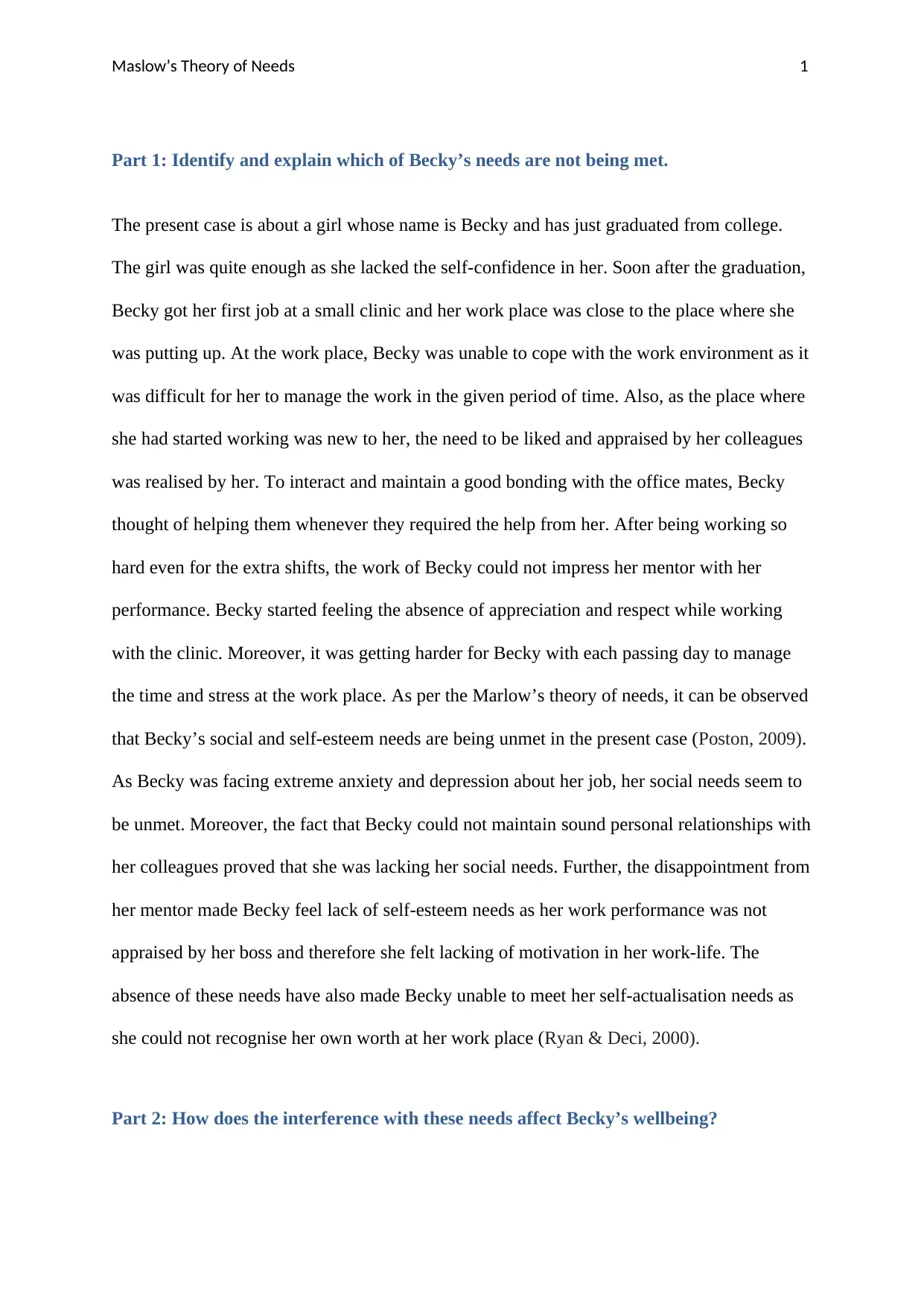
Maslow’s Theory of Needs 1
Part 1: Identify and explain which of Becky’s needs are not being met.
The present case is about a girl whose name is Becky and has just graduated from college.
The girl was quite enough as she lacked the self-confidence in her. Soon after the graduation,
Becky got her first job at a small clinic and her work place was close to the place where she
was putting up. At the work place, Becky was unable to cope with the work environment as it
was difficult for her to manage the work in the given period of time. Also, as the place where
she had started working was new to her, the need to be liked and appraised by her colleagues
was realised by her. To interact and maintain a good bonding with the office mates, Becky
thought of helping them whenever they required the help from her. After being working so
hard even for the extra shifts, the work of Becky could not impress her mentor with her
performance. Becky started feeling the absence of appreciation and respect while working
with the clinic. Moreover, it was getting harder for Becky with each passing day to manage
the time and stress at the work place. As per the Marlow’s theory of needs, it can be observed
that Becky’s social and self-esteem needs are being unmet in the present case (Poston, 2009).
As Becky was facing extreme anxiety and depression about her job, her social needs seem to
be unmet. Moreover, the fact that Becky could not maintain sound personal relationships with
her colleagues proved that she was lacking her social needs. Further, the disappointment from
her mentor made Becky feel lack of self-esteem needs as her work performance was not
appraised by her boss and therefore she felt lacking of motivation in her work-life. The
absence of these needs have also made Becky unable to meet her self-actualisation needs as
she could not recognise her own worth at her work place (Ryan & Deci, 2000).
Part 2: How does the interference with these needs affect Becky’s wellbeing?
Part 1: Identify and explain which of Becky’s needs are not being met.
The present case is about a girl whose name is Becky and has just graduated from college.
The girl was quite enough as she lacked the self-confidence in her. Soon after the graduation,
Becky got her first job at a small clinic and her work place was close to the place where she
was putting up. At the work place, Becky was unable to cope with the work environment as it
was difficult for her to manage the work in the given period of time. Also, as the place where
she had started working was new to her, the need to be liked and appraised by her colleagues
was realised by her. To interact and maintain a good bonding with the office mates, Becky
thought of helping them whenever they required the help from her. After being working so
hard even for the extra shifts, the work of Becky could not impress her mentor with her
performance. Becky started feeling the absence of appreciation and respect while working
with the clinic. Moreover, it was getting harder for Becky with each passing day to manage
the time and stress at the work place. As per the Marlow’s theory of needs, it can be observed
that Becky’s social and self-esteem needs are being unmet in the present case (Poston, 2009).
As Becky was facing extreme anxiety and depression about her job, her social needs seem to
be unmet. Moreover, the fact that Becky could not maintain sound personal relationships with
her colleagues proved that she was lacking her social needs. Further, the disappointment from
her mentor made Becky feel lack of self-esteem needs as her work performance was not
appraised by her boss and therefore she felt lacking of motivation in her work-life. The
absence of these needs have also made Becky unable to meet her self-actualisation needs as
she could not recognise her own worth at her work place (Ryan & Deci, 2000).
Part 2: How does the interference with these needs affect Becky’s wellbeing?
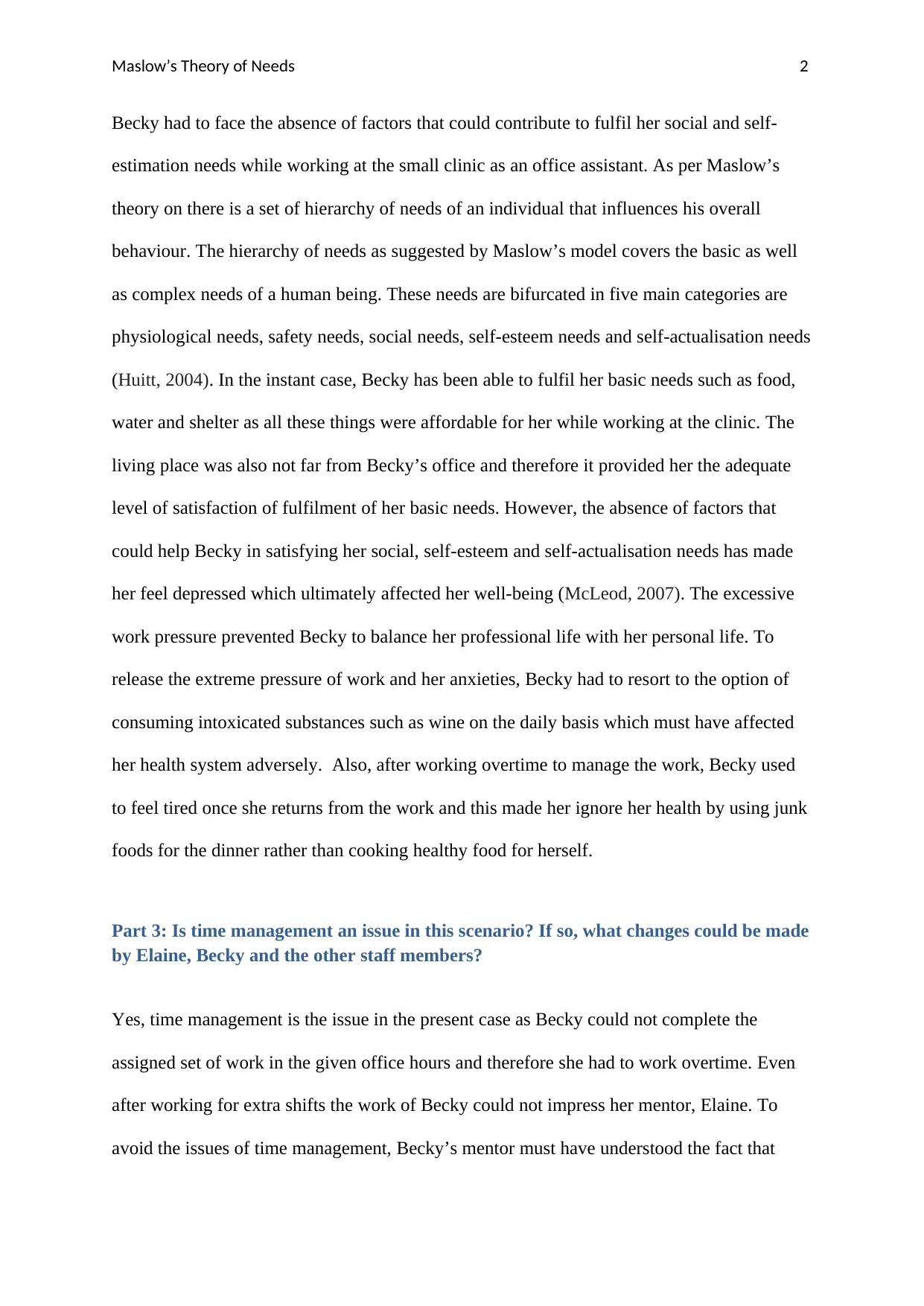
Maslow’s Theory of Needs 2
Becky had to face the absence of factors that could contribute to fulfil her social and self-
estimation needs while working at the small clinic as an office assistant. As per Maslow’s
theory on there is a set of hierarchy of needs of an individual that influences his overall
behaviour. The hierarchy of needs as suggested by Maslow’s model covers the basic as well
as complex needs of a human being. These needs are bifurcated in five main categories are
physiological needs, safety needs, social needs, self-esteem needs and self-actualisation needs
(Huitt, 2004). In the instant case, Becky has been able to fulfil her basic needs such as food,
water and shelter as all these things were affordable for her while working at the clinic. The
living place was also not far from Becky’s office and therefore it provided her the adequate
level of satisfaction of fulfilment of her basic needs. However, the absence of factors that
could help Becky in satisfying her social, self-esteem and self-actualisation needs has made
her feel depressed which ultimately affected her well-being (McLeod, 2007). The excessive
work pressure prevented Becky to balance her professional life with her personal life. To
release the extreme pressure of work and her anxieties, Becky had to resort to the option of
consuming intoxicated substances such as wine on the daily basis which must have affected
her health system adversely. Also, after working overtime to manage the work, Becky used
to feel tired once she returns from the work and this made her ignore her health by using junk
foods for the dinner rather than cooking healthy food for herself.
Part 3: Is time management an issue in this scenario? If so, what changes could be made
by Elaine, Becky and the other staff members?
Yes, time management is the issue in the present case as Becky could not complete the
assigned set of work in the given office hours and therefore she had to work overtime. Even
after working for extra shifts the work of Becky could not impress her mentor, Elaine. To
avoid the issues of time management, Becky’s mentor must have understood the fact that
Becky had to face the absence of factors that could contribute to fulfil her social and self-
estimation needs while working at the small clinic as an office assistant. As per Maslow’s
theory on there is a set of hierarchy of needs of an individual that influences his overall
behaviour. The hierarchy of needs as suggested by Maslow’s model covers the basic as well
as complex needs of a human being. These needs are bifurcated in five main categories are
physiological needs, safety needs, social needs, self-esteem needs and self-actualisation needs
(Huitt, 2004). In the instant case, Becky has been able to fulfil her basic needs such as food,
water and shelter as all these things were affordable for her while working at the clinic. The
living place was also not far from Becky’s office and therefore it provided her the adequate
level of satisfaction of fulfilment of her basic needs. However, the absence of factors that
could help Becky in satisfying her social, self-esteem and self-actualisation needs has made
her feel depressed which ultimately affected her well-being (McLeod, 2007). The excessive
work pressure prevented Becky to balance her professional life with her personal life. To
release the extreme pressure of work and her anxieties, Becky had to resort to the option of
consuming intoxicated substances such as wine on the daily basis which must have affected
her health system adversely. Also, after working overtime to manage the work, Becky used
to feel tired once she returns from the work and this made her ignore her health by using junk
foods for the dinner rather than cooking healthy food for herself.
Part 3: Is time management an issue in this scenario? If so, what changes could be made
by Elaine, Becky and the other staff members?
Yes, time management is the issue in the present case as Becky could not complete the
assigned set of work in the given office hours and therefore she had to work overtime. Even
after working for extra shifts the work of Becky could not impress her mentor, Elaine. To
avoid the issues of time management, Becky’s mentor must have understood the fact that
⊘ This is a preview!⊘
Do you want full access?
Subscribe today to unlock all pages.

Trusted by 1+ million students worldwide
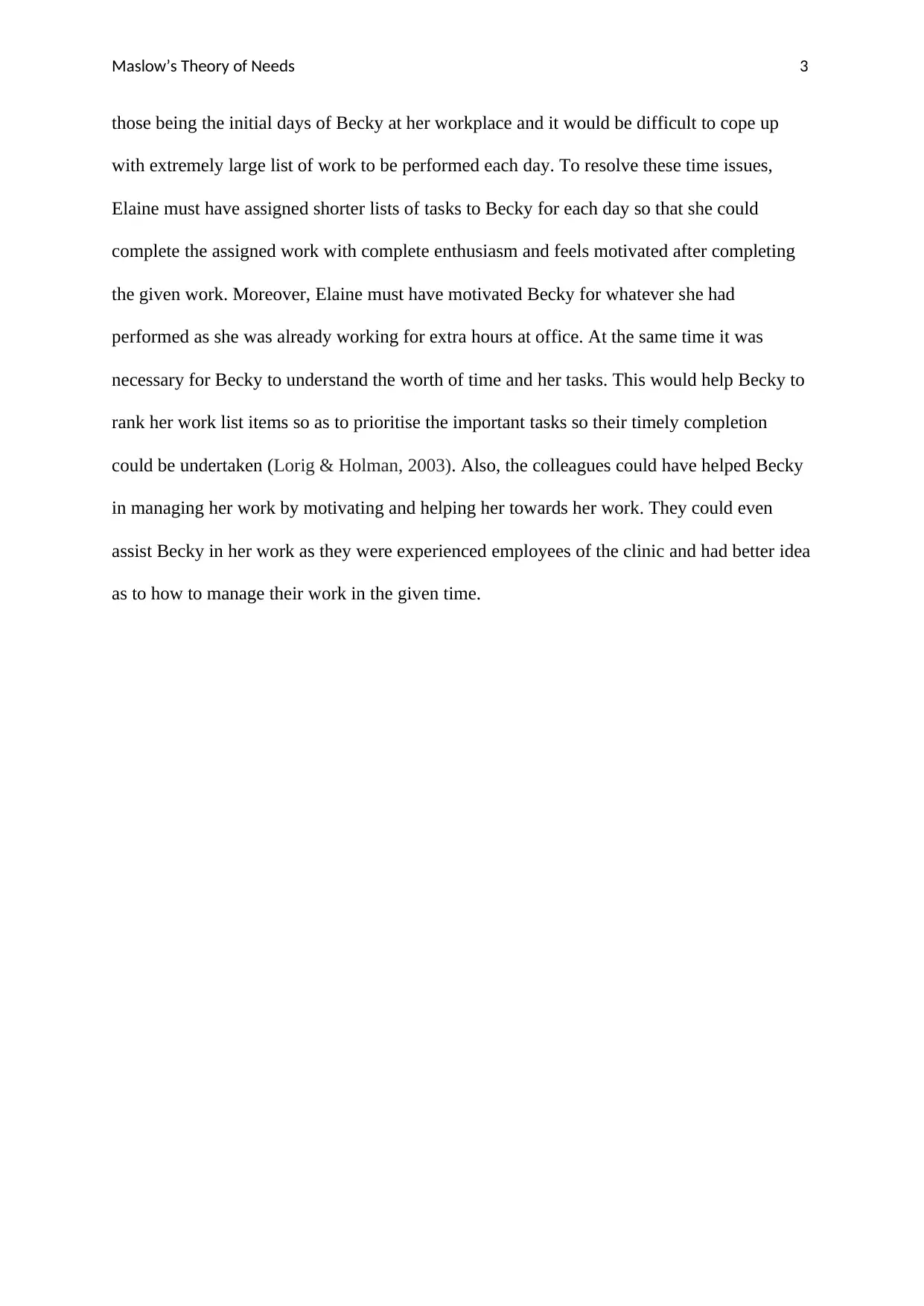
Maslow’s Theory of Needs 3
those being the initial days of Becky at her workplace and it would be difficult to cope up
with extremely large list of work to be performed each day. To resolve these time issues,
Elaine must have assigned shorter lists of tasks to Becky for each day so that she could
complete the assigned work with complete enthusiasm and feels motivated after completing
the given work. Moreover, Elaine must have motivated Becky for whatever she had
performed as she was already working for extra hours at office. At the same time it was
necessary for Becky to understand the worth of time and her tasks. This would help Becky to
rank her work list items so as to prioritise the important tasks so their timely completion
could be undertaken (Lorig & Holman, 2003). Also, the colleagues could have helped Becky
in managing her work by motivating and helping her towards her work. They could even
assist Becky in her work as they were experienced employees of the clinic and had better idea
as to how to manage their work in the given time.
those being the initial days of Becky at her workplace and it would be difficult to cope up
with extremely large list of work to be performed each day. To resolve these time issues,
Elaine must have assigned shorter lists of tasks to Becky for each day so that she could
complete the assigned work with complete enthusiasm and feels motivated after completing
the given work. Moreover, Elaine must have motivated Becky for whatever she had
performed as she was already working for extra hours at office. At the same time it was
necessary for Becky to understand the worth of time and her tasks. This would help Becky to
rank her work list items so as to prioritise the important tasks so their timely completion
could be undertaken (Lorig & Holman, 2003). Also, the colleagues could have helped Becky
in managing her work by motivating and helping her towards her work. They could even
assist Becky in her work as they were experienced employees of the clinic and had better idea
as to how to manage their work in the given time.
Paraphrase This Document
Need a fresh take? Get an instant paraphrase of this document with our AI Paraphraser
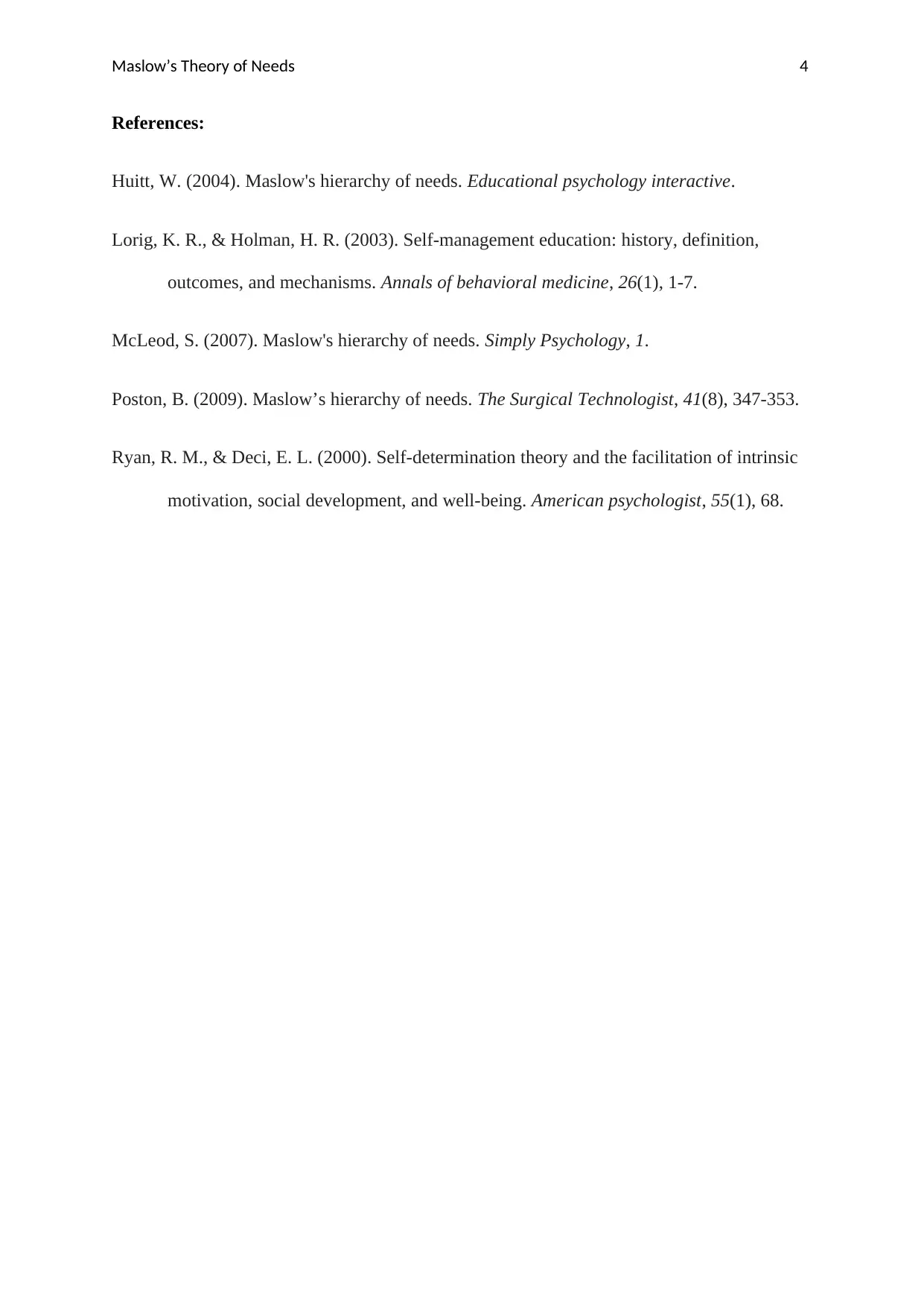
Maslow’s Theory of Needs 4
References:
Huitt, W. (2004). Maslow's hierarchy of needs. Educational psychology interactive.
Lorig, K. R., & Holman, H. R. (2003). Self-management education: history, definition,
outcomes, and mechanisms. Annals of behavioral medicine, 26(1), 1-7.
McLeod, S. (2007). Maslow's hierarchy of needs. Simply Psychology, 1.
Poston, B. (2009). Maslow’s hierarchy of needs. The Surgical Technologist, 41(8), 347-353.
Ryan, R. M., & Deci, E. L. (2000). Self-determination theory and the facilitation of intrinsic
motivation, social development, and well-being. American psychologist, 55(1), 68.
References:
Huitt, W. (2004). Maslow's hierarchy of needs. Educational psychology interactive.
Lorig, K. R., & Holman, H. R. (2003). Self-management education: history, definition,
outcomes, and mechanisms. Annals of behavioral medicine, 26(1), 1-7.
McLeod, S. (2007). Maslow's hierarchy of needs. Simply Psychology, 1.
Poston, B. (2009). Maslow’s hierarchy of needs. The Surgical Technologist, 41(8), 347-353.
Ryan, R. M., & Deci, E. L. (2000). Self-determination theory and the facilitation of intrinsic
motivation, social development, and well-being. American psychologist, 55(1), 68.
1 out of 5
Related Documents
Your All-in-One AI-Powered Toolkit for Academic Success.
+13062052269
info@desklib.com
Available 24*7 on WhatsApp / Email
![[object Object]](/_next/static/media/star-bottom.7253800d.svg)
Unlock your academic potential
Copyright © 2020–2026 A2Z Services. All Rights Reserved. Developed and managed by ZUCOL.





